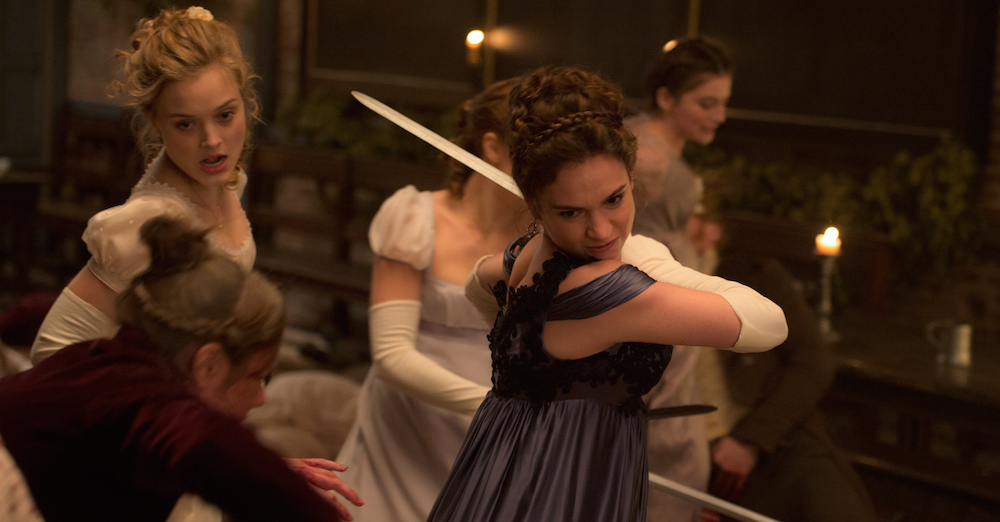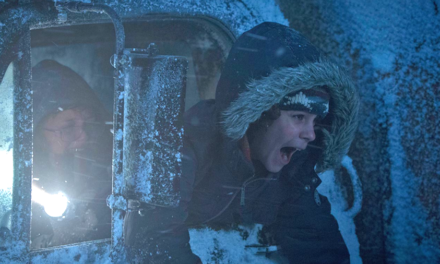For those of you unfamiliar with the book and now film Pride and Prejudice and Zombies, it’s fortunately one of the more descriptive titles in literary history. A remix of Jane Austen’s classic story of love, manners and status wherein the zombie apocalypse descends upon the Bennet family, Pride and Prejudice and Zombies is the kind of rip-roaring fun that you almost can’t understand until you’ve actually seen it.
Long gestating coming to the silver screen, Pride and Prejudice and Zombies finally hits theaters on Feb. 5. The Wheel participated in a conference call with Lily James (Elizabeth Bennet), Matt Smith (Mr. Collins), Bella Heathcote (Jane Bennet) and Douglas Booth (Mr. Bingley) to discuss what it was like to find love and kill zombies:
Ryan Lee, Rice University: What were some of the lines and moments that were not in the script that were improvised?
Matt Smith: Well, there were a few moments, actually. I went back to [Pride and Prejudice and Zombies] which [had Pride and Prejudice] as a source material to try and sort of make things up in an attempt to build up my part but there was quite a lot in [the script]. Actually, Burr [Steers], the director, was really good. He allowed a platform and an environment where you could take risks and sort of throw things out there that weren’t in the script, so it was an enjoyable experience for that for me.
Bill Lockie, Western University: Pride and Prejudice is for many people, [it’s] Jane Austen’s magnum opus, and a lot of people will go see a movie if it has the words Pride & Prejudice. But how do you sell the concept of “& zombies” to those Austen purists?
Lily James: I think that there’s been a lot of Pride and Prejudice’s before in the past. It’s been done very well and I think it’s always interesting if you love something to see it done in a different way. What we all found was kind of crazy. [Putting] something so surreal and strange as zombies in Pride and Prejudice somehow [helped] some of the scenes and relationships in the book become heightened. Liz Bennet gets to beat the crap out of Darcy, which is really a sort of a physical expression of all her sexual frustration. I mean that’s a very basic analysis but it was just interesting how the zombies kind of contributed.
Bella Heathcote: Yes. Jane Austen’s all about female empowerment and this film is, too. It just has a cynical expression because we get to beat the crap out of zombies. So there you go. I think they’d like it.
LJ: Girl power. Jane Austen would love girl power and so would Jane Austen purists.
MS: And also they’ve probably seen it done so many times. It has been done and near perfectly a few times as well, so it’s kind of cool for them to just see it in a different way.
Katie Altman, John Kerr University: What are you hoping that audiences, mainly students that are fans of Jane Austen, [will] take away from such a modern twist on a very classic story?
BH: That it’ll kick ass.
MS: Well, I just hope they have fun, really. It’s a really fun movie.
LJ: And also the zombies. What’s cool is that you get both. You get Jane Austen and you get Pride and Prejudice and that story, especially the love story all really remains the heart of the story. It’s a romance, it’s a drama, but then throw into that every time you’re maybe getting a bit bored, a big zombie attack. It really just makes it very exciting romp and quite scary and funny and it just all holds together.
BH: Yes. It’s like Austen but a bit less nutritional value, a bit more candy on top.
Kate Marquee, University of Missouri at St. Louis: This novel has had a kind of long, slow road to the screen and had gone through a number of different directors in particular, and writers and I was wondering if any of you had any trepidations about this prior to the beginning of the shoot? [Did you have] any fears that once things got underway were soothed?
LJ: Well, to make a film happen, I’ve learned, is such a long journey. I think The Danish Girl was in development for 13 years, so [it] didn’t worry me that the script had been around for so long. In fact, it really drew me into the project because when you hear — I think at one point, Bradley Cooper and Scarlett Johansson were going to do it and another point it was Anne Hathaway. These are people that I would really sort of respect.
And we hoped that sort of an alchemy came together this time, which is why it happened with [director Burr Steers]. There’s no rhyme or reason to why things happen when they do but we’re really happy that it did with this lovely cast.
Brandon Wagner, Emory University: Obviously, this is an immensely subversive take on this story and that gives you some leeway to bring in less traditional takes on these classic characters. Was there anything that you specifically put in to subvert these characters or our expectations of them or that you just thought was a particularly interesting twist that is provided by this kind of project?
LJ: I didn’t purposely try and subvert [Liz Bennet] because so much was just done anyway in the story, in the plot and the circumstance, but because of that I think my Liz Bennet is much angrier, much [more] spirited, sort of she says what she — she manifests what she feels more. She can’t hide it as well as, I think, Liz tends — does in the original.
MS: I think because there are zombies in the film, somehow eternally that allows you to make bold choices because the laws of the universe are slightly heightened and the characters that exist in it can therefore be slightly heightened. I think maybe subversive is the right word or the wrong word but just to reinvent characters that have been played before much like you would play Hamlet and every actor gives that their spin. I think with Jane Austen and this work it’s a similar idea. You’ve got to bring something new to the table. which everyone did.
LJ: And because it’s a period genre and because it was zombies it meant that we could be way more free. Like, we had knives hidden in our knickers, like we could do anything we wanted.
Douglas Booth: I actually had a badger down my pants the whole film or so I thought. Cold, cold days so very interesting on all fronts.
Christian Stanovitz, Villanova University: What was it like to act among fantasy-like creatures and what kind of training did you guys have to go through to fight off all those zombies in the movie?
BH: The girls went through quite a bit of training; I know because I trained with them. I did about three months by myself in L.A. and got really into kung fu and then came to London and met up with all the other girls. We did lots of different skill training with weapons and choreography and got very into it. I liked being on set with the zombies, even when they scared me.
LJ: I did like boxing and swung a bat against a punch bag for months. I was very unfit and very lazy prior to shooting, so I had to do a lot to get into shape and I loved it. We had such a fun time just beating the crap out of zombies, who were very frightening on set, especially when you’re trying to eat your lunch and the person opposite you [has their] face melting into their meal.
MS: I remember Mrs. Phillips, the woman that played with her face as it was falling off. It was really amazing prosthetics that she had on; that she actually looked like that [while] we were trying to eat lunch.
Opinion Editor | Brandon Wagner is a College Senior from God Only Knows Where, America studying Film and Media Studies with a minor in Religion. This is his first year for the Wheel, in a likely misguided experiment to be a film critic. When he's not writing on the biggest blockbusters or the films of Spike Jonze or Andrei Tarkovsky or Zack Snyder, he's writing on comedic television, the future of gaming as an art, or the relationship between audience and cinematic experience. In other words, Brandon Wagner has basically nothing else going on but this.






